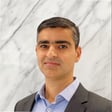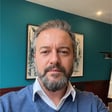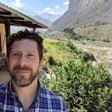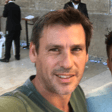Become a Creator today!Start creating today - Share your story with the world!
Start for free
00:00:00
00:00:01

Ilan Ofer
We talk about a tour of duty from being an engineer to business development to M&A at a number of large technology companies.
Recommended
Transcript
Introduction & Early Career
00:00:01
joewaltman
All right, today we've got Elon off for Elon. Thanks so much for joining.
00:00:05
ilan
Hey, thanks Joe for having me.
00:00:08
joewaltman
All right, first question, refresh your memories. What were you doing prior to NCIAD and what have you been up to for the last 20 years?
00:00:15
ilan
Okay, so prior to INSEAD I was actually an engineer, an electronics engineer, working, writing code and designing printed circuit boards. So I had i had't zero prior experience in business and for me INSEAD was, you know, not not just a great social experience but also You know, mind boggling in terms of you know actually learning what business is about. That said, maybe you know maybe a few years later I would have i would have benefited more from the INSEAD experience had I had some business experience prior to that because everything was completely new to me. um Posting INSEAD I did make the
Transition to Business
00:00:55
ilan
shift.
00:00:55
ilan
that I had plans to do before INSEAD, which is to switch from my engineering to to a business career. I started as a product manager and in a subsidiary of Siemens, the German conglomerate, um in telecoms.
00:01:09
ilan
And then I kind of meandered.
00:01:10
joewaltman
but Where was this, let let me interrupt you, was where was this geographically prior to and and post?
00:01:16
ilan
Yes, I've spent um most of these 20 years in my home country of Israel. um
00:01:20
joewaltman
Okay, okay.
00:01:21
ilan
with the With one exception, I spent one year working for that company that I've just mentioned, the Siemens. Actually, by that time, it was already a joint venture called Nokia Siemens Networks. So I spent one year in Munich. um But other than that, I spent the whole time over here in Israel. Part of the reason was also that my wife had a career running in parallel over here, an academic career. So that kind of kept us here.
00:01:51
ilan
Um, so, um, like I said, I was, I started out as a product manager, which was kind of a, a good stepping stone, you know, from the,
00:01:58
joewaltman
Actually, if you don't mind, sorry there up let's back up a little bit.
INSEAD & Networking
00:02:02
joewaltman
um what what how How back 20-odd years ago, how how how well-known was in Seattle and Israel, and and you know has has it changed much recently?
00:02:02
ilan
yeah.
00:02:14
ilan
Israel is very well known in Israel. It's you know amongst the businesses schools. So anyone who knows anything about MBAs knows in Seattle. It's ranked in, I would say, in the public perception, ranked up there alongside you know Harvard Business School and Wharton and software to the US School.
00:02:34
ilan
So everybody knows in Seattle. but I mean, in the business community, everybody knows in Seattle. um And that was the reason i I chose it in the first place. so And there's there's a very large community in Seattle, alumni over here in Israel, certainly compared with you know with the size of the country. It's attending the population 10 million, and there's, I think, around 400 or 500 alumni over here. So it's a sizable community.
00:02:59
joewaltman
oh
00:03:02
joewaltman
All right, so this is part of the interruption. Let's let's get back to your your first, your first role at Siemens after, after it's yet.
Career Progression
00:03:08
ilan
Yes, I'll just run through it very quickly. So i like I said, I started in product management, which is a kind of good segue from the technical world to the business world. um I spent a couple of years there, and then I slowly shifted towards the world of business development, which is a kind of a rather term that can pretty much mean anything. But in in my case, I started out with accounts management, so managing managing strategic accounts onto opening new markets, first in Europe, then in Asia, and then moving towards partnerships, joint ventures, and in recent years, as I would say in the last decade, mostly around M&A, mergers and acquisitions.
00:03:48
joewaltman
Okay. And so this, this, uh, let's, your, your, we're going very quickly. I'm going to continue interrupting you. Uh, this, this, uh, this, this was all with Siemens.
00:03:53
ilan
Yeah, sure.
00:03:56
ilan
No, no, no, so I ran, I ran,
00:03:57
joewaltman
Still. Okay. So let let's, let's, let's talk then a little bit like what, what, what specific products were you working on at Siemens? And then, you know, what specifically, what were you, where did you, did you then move to a different different company? ah but let Let's put a little bit of context in this.
00:04:10
ilan
Yes, first I was a product manager for the their subsidiary, a local subsidiary over here in years Israel in Siemens. I was managing a product line of but basically ah communication devices that were used in in the and network, network communication devices. um Then there was a shake-up in the company. There was a merger between Siemens Communications, the telecoms division of Siemens and Nokia Networks, which then became Nokia Siemens Networks. and then I, you know, took the opportunity to move to a new job in the services division of, of of NSN, Nokia Syncios Networks in Munich. So that was that one year in in Munich, um where I was working, that that was actually my my first foray into business development. I was part of the strategy team of NSN, the corporate strategy team looking for innovations and and partnerships.
00:05:06
ilan
um And then, you know, as often happens in in big companies, there was ah yet another reorg, where they moved, they shifted the the headquarters of that division to India.
Return to Israel & Sandisk Experience
00:05:16
ilan
um And at that point, I decided to move back to Israel. It sort of coincided with my wife's career. She got a tenure in the Open University of Israel, so it kind of makes sense, it made sense for us to go back. um So, when like I went back to Israel. And then, you know, as as nokeim as as the division I'm working for it at NSN kind of disintegrated and and moved many of the people to India, I switched to a semiconductor company, a US semiconductor company called Sandisk, where i I basically was an account manager. I managed the accounts first in Europe of of other semiconductors companies, such as Texas Instruments or the European.
00:06:01
ilan
um um locations of Texas Instruments, ST Micros, and then I got responsibility for Asia as well. So I managed the the accounts of semiconductor makers in Taiwan and China. That was a great experience. I spent a few years driving China, spending almost a year a week every month in in China, meeting you know basically the entire semiconductors and and Consumer Electronics um ecosystem in China, that that was fascinating. One of the best chapters chapters in my career.
00:06:38
ilan
um And so that that was SANDIS. At some point, again, it goes back to, you know, mergers and acquisitions. So SANDIS got but taken over by Western Digital and the Israeli part was slowly being emptied of of business people because it doesn't make sense to you know have corporate business functions in Israel since you know it's a small market and the headquarters of the company were not in Israel anyway um so again the choice was either um um relocating to Milpitas in California whether the company headquarters was or
00:07:22
ilan
to to Asia where most of my business was. And since I couldn't relocate because of my wife's career, I um i quit after five years in the company. um And then after a short short gig with with with another company, which is not worth spending time on, I moved to a company called Overtek, one of Israel's biggest tech companies at the
Expansion into M&A with Orbotech
00:07:49
ilan
time.
00:07:49
ilan
um where I was reporting to the chief strategy and marketing team officer of the company and and I led the M and&A and partnerships. That was my first foray into mergers and acquisitions, so you know a role that I hold to this day.
00:08:01
joewaltman
what does this what does well What does this company do?
00:08:06
ilan
So the company, again, um it's a kind of recurring theme in my career. ah The company doesn't exist anymore because it was itself acquired by KL8, one of the giants, the semiconductors giants in the US.
00:08:19
ilan
which just happens to be a neighbor of Sandisk over there in New Peters, but this is pure coincidence. um So, Orbitech at the time was a a large company, a public company traded on NASDAQ. It reached turnover of about $1 million, dollar and it made them um machines for um manufacturing of microelectronics, including semiconductors, printed circuit boards and and flat panel displays.
00:08:46
ilan
um and so And so, you know, hardcore electronics, which kind of threw me back to my my origins and, you know, being an electronics engineer.
00:08:53
joewaltman
Hmm. So it's almost like, it's like upstream of the chip fabs. It's, it's the stuff the chip fabs buy to make the chips.
00:09:05
ilan
Right, exactly. So chip fabs were amongst our customers. Like I said, sometimes we're part of about a third of our business, but chip fabs and semi and test fabs were amongst our customers.
00:09:17
ilan
um So, you know, those large room-sized machines that cost millions of dollars to make, to buy, that are part of the manufacturing process of microelectronics.
00:09:17
joewaltman
Hmm.
00:09:29
ilan
um That was the company that I loved best and you know through the course of my career, and I had the pleasure of you know working on some interesting deals. Again, it was a very Asia-oriented company,
00:09:29
joewaltman
Gotcha.
00:09:44
ilan
um you know Since much of of manufacturing takes place and in in Asia and China and South Korea and Taiwan and Japan, so you know I had the pleasure of working in those geographies again for a few years, working in partnerships and opening new markets. um For example, in automotive, in manufacturing software and as well as making acquisitions, making some transactions for the acquisition of companies in that area.
00:10:12
ilan
And that was my first experience into M and&A, um which I continued throughout most of the past past decade.
00:10:23
ilan
um Then when Obotek got acquired by KLA, again, the same story going back to what I told you at Sandisk. Again, you know the the corporate functions were taken out of Israel and moved to California. and i yet again, found myself in a position of either relocating or finding a new job. um and And so I was hired at a company which was then still private, called Celerite, in the cyber intelligence space. I was brought into Celerite as VP at corporate business development for the express purpose of establishing and leading the M and&A practice in the company, which is what I did. First, it was a private company and ahead of a large um
00:11:08
ilan
private placements, the purpose of which was to prepare the company for ah going public, which it did in 2021 on NASDAQ. um Again, that was a great experience leading for sizable transactions as well as you know going through this process of um becoming public. i you know I couldn't say that I led the process of of taking the company public, that I couldn't take credit for that, but being part of the process was was very interesting.
00:11:38
ilan
um One of the more, I would say, rewarding chapters. um And then interestingly enough, after having spent years, a better part of 20 years in large large corporations, um I was given the opportunity, I was actually approached by the former CEO of my former employer, Overtech, who by that time had sold the company.
00:12:03
ilan
and made a lot of money and started investing and in startups and you know sitting on the boards of of various startups. And he offered me to join one of the star one of the startups that he was chairing in the agrotech space, so in agriculture.
Exploring Startups in Agrotech
00:12:18
ilan
And after many years in large companies, I i you know i lead to the opportunity to experience the startup world for the first time in many years.
00:12:33
joewaltman
what what i'm let Let me get i'm going interrupt you again. What I'm really shocked is you know see if somebody who doesn't work in tech, this all just sounds like technology, but these are very, very different kinds of companies, different kinds of you know ecosystems and and jumping around like this from chip manufacturing to what you call the cyber intelligence to agrotech. These are these are like separate industries unto themselves.
00:12:57
ilan
You're absolutely right. So in that respect, Michael has zigzagged between industries. I would say the common denominator to all these are is one business development or corporate business development, and the other is technology, right? So these these are all at technology companies, which is, to be fair, I'm not saying much because, you know, comparing a company like Cetabrite, which is a software company in the cyber intelligence space versus Obotec, which is a hardware company in semiconductors and PCBs, these are entirely different businesses
00:13:26
joewaltman
Every company is a technology company these days.
00:13:26
ilan
in tiny business models. I'm sorry.
00:13:30
joewaltman
Every company is a technology company these days. here Go ahead. I'm sorry. I made but i was making an interruption. Carry on. I apologize.
00:13:39
ilan
Yeah, um so so it has the exact respect but but but you know that the the functions of you know, buying partnerships and and making acquisitions are at the end of the day you know it's it's practice that that is similar regardless of you know what is the underlying product or or technology.
00:13:53
joewaltman
Fair enough.
00:14:03
ilan
um So that brought me to my startup experience um and then I joined the founder of this
00:14:12
joewaltman
Well, hold on. hold on what so What exactly did this agrotech company do? Because this this this sounds very interesting.
00:14:19
ilan
Yeah, so that that was an interesting story. It's a company that had been around for a while, um basically selling technologies for high-tech greenhouses for mainly the cannabis space, which was overhyped. We're talking 2021 now, 2022. But it it pivoted towards vertical farming, which is basically about growing um crops In our case it was tomatoes and cucumbers and peppers. In closed rooms, in closed chambers, with fully monitored and regulated the conditions, so lighting, temperature, humidity, everything is regulated and controlled. So that you can you can basically grow any crop in any season anywhere in the world, even in other the states.
00:15:17
ilan
um without any constraints, the only real constraint, which is what eventually killed us, is of course the cost. So it's very costly. um And so we targeted mainly geographies where which were, I would say, agriculturally challenged, but that have the resources and the and the desire to um that build the infrastructure for um for agricultural independence or you know for food safety.
00:15:59
ilan
um Places like Singapore, like the Gulf region, countries like the UAE or Qatar or Saudi Arabia.
00:16:05
joewaltman
Mmm.
00:16:09
ilan
um That was our purpose. We had a pilot running, um but then then about a year after I joined the company, we raised about $4 million dollars in in seed capital, but we failed to raise the size of a round day, and that's how we found ourselves.
00:16:27
joewaltman
It sounds like ah a pretty normal story, but I can't resist the urge to ask a question about what about the cannabis stuff.
00:16:30
ilan
yeah
00:16:33
joewaltman
so what you know we're At least here in the United States, if I imagine in other parts of the world, there's there's been a lot of legalization going on. and The the sort of surprising result that people have found out, I'm asking you if you can confirm this from your experience at working in the industry, is that ah the the the legalization's meant that that now manufacturing it or growing it or producing whatever is the right word is, has that's become much much easier and much cheaper and whatnot, but demand hasn't really kept up with with the supply.
00:17:02
joewaltman
Basically saying that there weren't a whole bunch of people who were waiting around for marijuana to become legal before they started using it.
00:17:06
ilan
because
00:17:08
joewaltman
They weren't going to use it. They've been using it forever. and The legal agents made it easier and cheaper to access. It didn't increase a bunch of demand. um and that Basically, these these cannabis companies aren't making these you know huge profits that they were expecting to for that reason.
00:17:23
ilan
So I hope that I hope I heard your question correctly and like I said it's a little bit patchy but I think I understood what you said so um my main focus in the company was like I said you know the company's history was around cannabis but but my main task was to pivot it towards a vertical farming so I couldn't claim to be an expert of cannabis but I can confirm that from what I did learn during that year is is that you're right there was ah by that point there was over capacity of
00:17:40
joewaltman
I see, okay, okay.
00:17:52
ilan
uh... production of of uh... cultivation of cannabis both legal and illegal uh... the fact that the legalization of went uh... that went on in many states in the u.s. although itally it was always on a state level would never uh... uh... reached the federal level uh... which was also a kind of constraint uh... that's how you're absolutely right it hasn't increased uh... demand and while uh... uh... uh... supply was was uh...
00:18:21
ilan
saturated. so you know and that A lot of legal cannabis companies struggled. It was still cheap cheaper for many people to buy, cheaper and and and and and readily available for people to buy, the illegal stuff.
00:18:36
ilan
So there wasn't enough incentive for people you know to pay 20 bucks for a joint in a dispensary um in legal dispensary. that That was my impression. um Again, I can't say that I'm a world expert on that, but I think you you're spot on.
00:18:46
joewaltman
Okay.
00:18:51
joewaltman
All right. Let's, let's, let's move on to the next one.
00:18:56
ilan
I'm sorry, can you say that again?
00:18:57
joewaltman
See you, you were, you were this, this agri-company um
Return to Corporate with Amdocs
00:19:01
joewaltman
shut down.
00:19:01
ilan
before
00:19:01
joewaltman
and And then you, you're saying you, you you re reconnected with a former boss, uh, to, uh, to for for your next thing.
00:19:10
ilan
Right, so so indeed that startup experience, which was fun, was great fun, but that ended as you know as the money ran out.
00:19:21
ilan
um And then I found myself back in the corporate world working for a company called Amdocs. It's a public company, a large company, one of this world's largest and software and services for telecoms world. um And again, I'm in corporate developments, one of the two people leading the company's M and&A. I'm ready to be new in the company, so what?
00:19:48
ilan
not relatively i'm new in the company, so I've been around for two months. um So, you know, no, no achievements to to speak of yet, but what does Amdocs do?
00:19:59
joewaltman
And what what is, I've certainly heard the name, but what what exactly does Amdocs do?
00:20:06
joewaltman
Yeah.
00:20:08
ilan
So Andux, at its core, is a software company. So it sells all kinds of software for telcos, like AT and&T or T-Mobile in the US, or Vodafone and these guys. um Billing software, CRM, ah basically business support software event of of various sorts. So that's kind of the way that it likes to present itself, but but in in To be totally honest, most of its business is around services. So it's it sells the software, and then it sells much more services to deliver the software, to integrate it, and to maintain that these software systems. So that's where most of the company's revenue comes from. It's a large company, so around $5 billion dollars in in turnover. these These are numbers that I i can just go because it's a public company.
00:21:04
ilan
um thats it That in a nutshell is what they do.
00:21:09
joewaltman
Gotcha. And you've been there for how long?
00:21:12
ilan
Two and a half months now.
00:21:14
joewaltman
Oh, wow.
00:21:14
ilan
12 weeks.
00:21:15
joewaltman
Very new. Very new.
00:21:16
ilan
Yeah.
00:21:19
joewaltman
Excellent. Well, thanks for for um walking us through that.
Conclusion & Reflections
00:21:23
joewaltman
like we We always end the these conversations with ah with a kind of a two-parter. Is there anything that we as the community can do to to help you where you are you know either personally or professionally and and vice versa?
00:21:34
joewaltman
Are there any things you you might be able to do to help us?
00:21:39
ilan
I'm sorry I didn't fully hear what you were asking. for you
00:21:43
joewaltman
Is there anything we as the community can do to help you either personally or or or professionally and vice versa? Is there anything that you might be able to do to to help us, the you know your your colleagues?
00:21:55
ilan
Nothing that comes to mind at the moment, but we should let you know if I think something
00:22:04
joewaltman
Oh, wonderful, wonderful. And we we we can keep in touch over the ah over the WhatsApp group. But hey, thanks so much for your time. Really really nice to catch up and and great to hear what you've been up to.
00:22:13
ilan
Thank you, Joe, for this great initiative. It's really amazing. I mean, I've listened to other podcasts and it was it was really was really fascinating. So thanks for that.
00:22:23
joewaltman
Hey, thank you. Thank you. Bye bye.



















